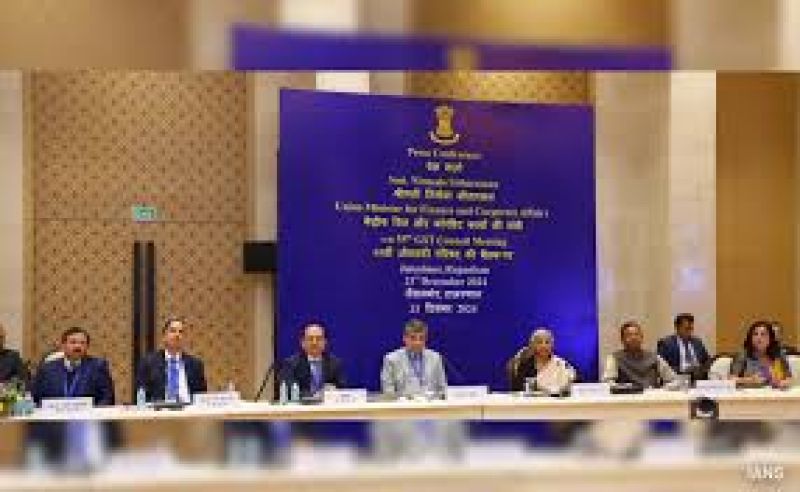The 55th GST Council meeting was held on December 21, 2024, in Jaisalmer, Rajasthan, under the chairpersonship of the Union Finance and Corporate Affairs Minister. The council discussed and approved various measures aimed at simplifying GST compliance, addressing ambiguities, and providing relief to taxpayers.
Wait for Official circulars and Notification for applicable dates and detailed explanaitons
1. Amendment in Schedule III of the CGST Act, 2017
- A new clause (aa) was inserted in paragraph 8 of Schedule III, effective retrospectively from July 1, 2017.
- Supplies of goods warehoused in Special Economic Zones (SEZ) or Free Trade Warehousing Zones (FTWZ) to any person, prior to clearance for exports or the Domestic Tariff Area (DTA), will not be considered as a supply of goods or services.
- This aligns SEZ/FTWZ transactions with the existing GST provisions for Customs bonded warehouses.
2. Clarifications on Taxability of Vouchers
To address ambiguities surrounding vouchers, the council made the following decisions:
- Sections 12(4) and 13(4) of the CGST Act, 2017, and Rule 32(6) of CGST Rules, 2017, are omitted.
- Key clarifications:
- Vouchers are neither goods nor services.
- Principal-to-principal distribution of vouchers is exempt from GST.
- Principal-to-agent distribution attracts GST on commissions or fees.
- Services such as advertising, co-branding, and marketing related to vouchers attract GST.
- Unredeemed vouchers (breakage) are not subject to GST.
3. Clarification on Input Tax Credit (ITC) by E-Commerce Operators
- E-commerce operators (ECOs) are not required to proportionally reverse ITC under Sections 17(1) or 17(2) for supplies where tax is paid under Section 9(5) of the CGST Act, 2017.
4. ITC Eligibility for Ex-Works Contracts
- Goods delivered at the supplier’s premises are considered “received” under Section 16(2)(b) of the CGST Act, 2017, making them eligible for ITC.
5. Late Fee Waiver for Filing GSTR-9C
- For the annual returns of FY 2017-18 to 2022-23, late fees for filing GSTR-9C (Reconciliation Statement) are waived if filed on or before March 31, 2025.
6. Introduction of a Track and Trace Mechanism
- Section 148A has been inserted to empower the government to implement a track-and-trace system for evasion-prone commodities.
- Unique Identification Markings will trace goods across the supply chain.
7. Declaration of State in Online Services
- Suppliers of online services, including OIDAR services, must record the state of the unregistered recipient on invoices. This state name will be deemed the recipient’s address.
8. Amendment to Section 17(5)(d)
- The phrase “plant or machinery” is replaced with “plant and machinery,” effective retrospectively from July 1, 2017, to align with the intent of the section.
9. Reduced Pre-Deposit for Appeals
- Pre-deposit for penalty-only appeals is reduced to 10% for filing before Appellate Authorities or Tribunals.
10. Definitions for Local and Municipal Funds
- Section 2(69)(c) is amended to define “Local Fund” and “Municipal Fund.”
11. Changes to the ISD Mechanism
- Inter-state Reverse Charge Mechanism (RCM) transactions are explicitly included in the Input Service Distributor (ISD) framework.
- These changes will be effective from April 1, 2025.
12. Temporary Identification Numbers for Non-Registered Persons
- Rule 16A is introduced to allow tax officers to issue temporary identification numbers to unregistered persons making payments under Rule 87(4).
13. Updates for Composition Taxpayers
- Composition taxpayers can now update their category in FORM GST CMP-02 via FORM GST REG-14.
14. Enhancements to the Invoice Management System (IMS)
- Section 38 and Rule 60 are amended to provide a legal framework for GSTR-2B generation based on IMS actions.
- GSTR-3B filing is permitted only after GSTR-2B is available.
15. Clarifications on Penal Charges and Payment Aggregators
- No GST applies to penal charges levied by banks or NBFCs for non-compliance with loan terms.
- RBI-regulated payment aggregators are eligible for GST exemption.
16. Regularization of Certain Transactions
- Renting of commercial properties by unregistered persons to registered persons under reverse charge mechanism is regularized retrospectively from October 10, 2024.
17. Changes to Accommodation and Restaurant Services
- GST rates on restaurant services are now linked to the “value of supply” of hotel accommodations in the previous financial year.
- Hotels can opt for 18% GST with ITC or 5% without ITC by declaring their preference.
18. Measures for Operational Efficiency
- The council approved procedural rules for GST Appellate Tribunals (GSTAT), to be implemented after legal review.
19. IGST Settlement Enhancements
- A committee will finalize measures for IGST settlement by March 2025.
20. Uniform Policy for Disaster Levies
- A GoM will be constituted to recommend a uniform policy for imposing levies in cases of natural disasters.
Conclusion
The 55th GST Council meeting has introduced significant changes aimed at clarifying tax provisions, streamlining compliance, and providing relief to taxpayers. These recommendations, once notified, are expected to enhance operational efficiency and address long-standing ambiguities in GST implementation.
